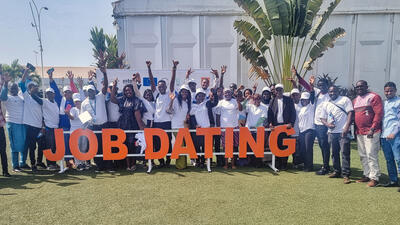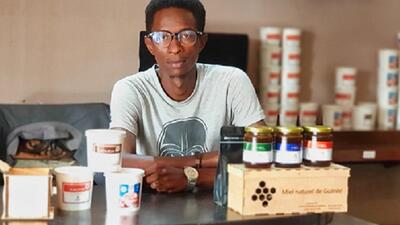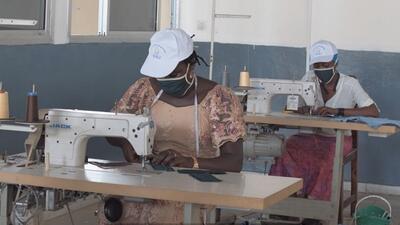

Guinea: Boosting youth initiatives and entrepreneurship
ITC programme seeks to create jobs and economic growth by encouraging, educating prospective business owners
With more than 75% of its people under the age of 35 and a median age of 19, Guinea boasts one of the world’s youngest populations. Giving youth opportunities at home, building on resources and reducing irregular migration are among the country’s most pressing priorities.
To address those concerns, the Government of the Republic of Guinea and the European Union launched the ‘Support programme for the socio-economic integration of the Guinean youth’ (INTEGRA) to enable economic opportunities for the country’s youth.
Funded under the European Union Emergency Trust Fund for Africa for a duration of four years, INTEGRA seeks to tackle economic root causes of irregular migration, supporting entrepreneurship and job creation at the grass-roots level and providing opportunities for growth.
‘My initial goal was to create jobs for others,’ said Mamady Kobele Keita, managing director of environmental-services firm Enviro Africa. ‘At the time I used to work some 10 hours a day for my employer. I wondered what it would be like to use the same 10 hours working for myself.
‘When the entrepreneur knows that he is working for himself, he gives his all. We managed to create local jobs for youths who did not believe in themselves.’
In line with government priorities, the International Trade Centre (ITC) accepted the challenge to support those efforts by increasing the employability of 15,000 youths and creating some 3,000 jobs. To that end, it developed a four-pillar approach to promote youth entrepreneurship; skills development; access to finance; and improved competitiveness of micro, small and medium-sized enterprises (MSMEs) in the agricultural and information and communications technologies (ICT) sectors. This has helped prospective business owners realize their ambitions while creating opportunities for others.
‘Beyond the desire to be my own boss, I decided to become an entrepreneur to have an increased impact on my community,’ said Fatou Camara, managing director of Monarch Services. ‘As a matter of fact, there is a lack of expertise in the areas of ICTs and marketing in Guinea. I therefore wanted to bring my contribution to improve quality in those sectors.’
The programme has advanced on several fronts since its inception in November 2018, especially on the initiatives supporting youth entrepreneurship have made particular headway.
The city of Boffa, known for its mining activities and tourism potential, will in June host a business incubator in the premises of the city’s youth centre. The initiative is part of an agreement between ITC and Guinea’s Ministry of Youth and Youth Employment to build support for entrepreneurship and boost the creation of sustainable economic opportunities for local youth.
Named ‘Walyètèbè’, which means ‘working for yourself’ in the Sousou language, the programme will support young entrepreneurs with training, coaching, knowledge transfer and networking.
The first of its kind, Boffa’s incubator will be replicated in three other regions of the country.
Like many African countries Guinea is facing a high rate of youth joblessness, a condition exacerbated by its youthful population. Given the reduced scope of the formal private sector and limited job opportunities in the public sector, entrepreneurship and self-employed work would be an appropriate response to youth unemployment.
‘The private sector is the key driver for investment as it plays a central role in wealth and job creation,’ said Gabriel Curtis, the Guinean minister of public-private investments and partnerships. ‘In Guinea, entrepreneurship can be part of the solution to many challenges faced by the population – and youth in particular – namely migration, socio-economic insertion and financial autonomy.’
It is in this spirit that ITC and the Guinean Employment Promotion Agency (Aguipe) supported the organization of the first edition of the Salon des entrepreneurs de Guinée (SADEN), a citizen’s initiative emanating from the youth themselves. With some 2,000 visitors from home and abroad, the innovative forum addressed opportunities and challenges of entrepreneurship in the country, providing inspiration and focus.
‘Africa has a wealth of opportunities. It is now time that African youths explore those possibilities and that African society can benefit from the success of their sons and daughters,’ Camara said. ‘I would like to keep on promoting entrepreneurship in Guinea through initiatives such as the Salon des entrepreneurs de Guinée and specific training programmes.’
Access to credit and capital remains a major constraint for MSMEs, not only at the start of their activities but also for their subsequent growth.
‘Young entrepreneurs do not always have funds or know their way around to initiate their activities,’ said Swann Diallo, managing director of hotelier MLYS. ‘Besides, they do not always have a sense of economics or might not have planned to be involved in an entrepreneurial project. It is essential to work with experienced partners who can help you achieve both your vision and mission.’
Thanks to the establishment of a pool of financial counsellors, ITC works towards facilitating access to funds for Guinean youth-owned businesses and projects. After completing a training programme in business support, selected consultants will be joining private-sector institutions to help the beneficiaries become more competitive and attractive for investments. In the next two years certified advisors are expected to work with at least 600 entrepreneurs. That kind of commitment can help budding businesses realize even their grandest dreams.
‘We would like to build other installations in the West African region and more widely on the continent,’ Diallo said. ‘More importantly, we would like to become a reference on the African continent and thereby promoting Africa in the world.’






